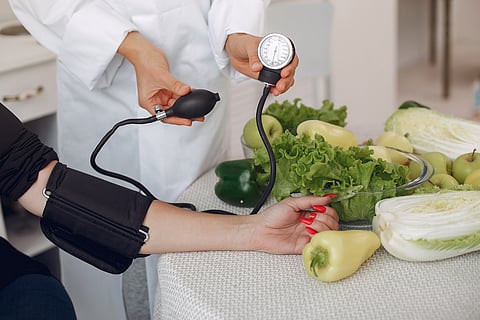

Amid the chaos of daily life, high blood pressure can sneak up on us without warning. With World Hypertension Day approaching on May 17, doctors are reminding us to take a moment to pay attention. It’s time to listen to our bodies, make small changes and protect ourselves from this silent danger.
“Early signs or symptoms of hypertension that busy professionals often overlook include frequent headaches, dizziness, fatigue, blurred vision, or a pounding sensation in the chest or head,” explains Dr Shraddha Sanghani, consultant internal medicine at Renova Century Hospitals. “However, high blood pressure is often called a ‘silent killer’ because many individuals experience no symptoms at all until serious complications arise. Busy professionals may attribute these subtle signs to workload or fatigue and miss early diagnosis,” informs the doctor.
And stress — especially the kind you carry to work and bring back home — is one of the major culprits. “Chronic stress leads to repeated surges of cortisol and adrenaline, which narrow blood vessels and increase heart rate, both of which raise blood pressure. Additionally, stress often leads to poor lifestyle choices such as unhealthy eating, alcohol consumption, smoking, and inadequate sleep, lots of screen time and improper sleep timings which don’t synchronise with the biological clock, all of which further contribute to hypertension,” she says.
Dr Madhu Vamsi, MBBS, MD Psychiatry, founder & chief psychiatrist at MV Clinics, says the emotional burden of the modern workday isn’t just exhausting — it’s dangerous. “Psychological factors such as chronic stress, job strain (high demand/low control), burnout, perfectionism, hostility, and Type A personality traits have been strongly linked to hypertension. Studies show that job strain alone increases the risk of hypertension by 30–50% (Kivimäki et al., Hypertension, 2012). Additionally, lack of perceived support at work is associated with higher systolic and diastolic pressures,” he explains.
What’s worrying is that more than 46% of adults with hypertension don’t even know they have it, according to WHO. “Some symptoms can include morning palpitations, tinnitus, visual disturbances, fatigue and poor concentration,” Dr Vamsi expresses.
Fortunately, there’s a way forward — and it doesn’t involve overhauling your life overnight. “Lifestyle changes are foundational in managing and preventing hypertension. These include quitting smoking, reducing alcohol intake, engaging in regular physical activity, limiting salt intake, managing stress effectively, and maintaining a healthy weight. Even modest weight loss can have a significant impact on blood pressure control,” says Dr Sanghani.
The right diet can also be powerful. “30–60 minutes of aerobic exercise 5 days/week – reduces BP by 5–8 mmHg, start the DASH diet: Low in sodium, rich in potassium and fiber and reduce sodium intake to <2g/day,” she adds.
Mental health plays a quiet but vital role. “CBT has shown moderate but significant benefits — reducing systolic BP by around 4–7 mmHg and diastolic BP by 3–5 mmHg, enhancing emotional regulation, reducing catastrophising, and improving coping — especially when combined with lifestyle changes and medication,” says Dr Vamsi.
And don’t forget to sleep. “Very important. Less than six hours of sleep per night increases the risk of hypertension by 20–30%,” he warns and also talks about sleep hygiene tips, “Consistent bedtime, even on weekends, avoid screens and heavy meals before sleep and use blackout curtains or sleep masks if working night shifts.”
We are often too caught up in our lives that we do not get a chance to think about our health. This World Hypertension Day, stop for a moment, move around, eat well, sleep well, and take your time to heal and keep going healthy.